The Power in Our Collective Voices: Building Your Skills as an Early Childhood Advocate
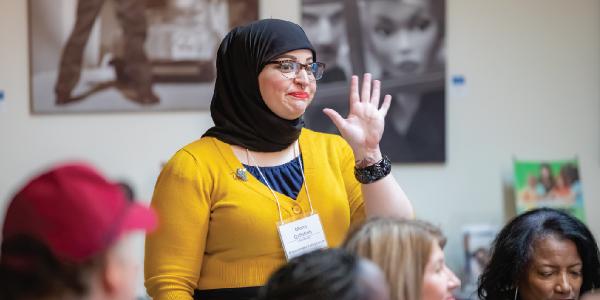
You are here
Children, families, and early childhood educators are the bearers of many rights—the right to love, care, joy, and equity. Children have the right to playful learning that celebrates their curiosity, ideas, and exploration and to be seen as active protagonists in their learning journeys, developing their identities and abilities through relationships (Edwards, Gandini, & Forman 2012; NAEYC 2020a). Families have the right to accessible, affordable, quality child care, and educators have the right to meaningful and reflective professional development, effective collaboration, and fair compensation. Engaging in early childhood advocacy can help affirm and actualize these rights.
As an early childhood educator, you can bring your perspectives and knowledge to influence the greater good of the profession. Your contributions are essential to the larger movement of advocates across the nation who are advancing equity and racial and social justice in early childhood education. The role of an early childhood educator is “defined not individually but rather as a colleague co-acting within a network” (Edwards & Gandini 2015, 93). There is power in our unified voices; we can collectively advocate for equitable public policies and funding that support children and families now and for future generations (IOM & NRC 2015; American Federation of State, County and Municipal Employees et. al 2020).
However, like many educators, you may feel unsure about how to advocate for the profession. Much like deepening your understanding of early childhood content or refining intentional interactions, advocacy takes practice and a lifelong commitment to developing these skills. There is no one-size-fits-all model because each context is unique. However, there are some shared strategies that you can leverage to develop your advocacy skills to connect meaningfully with elected officials and to increase awareness and support.
The three authors of this article have experience as professional development coaches, NAEYC affiliate leaders, and early childhood professors who have worked collaboratively over many years to build a grassroots movement of activated advocates to advance equity in early childhood education in Arizona and across the nation. In the process, we have had the opportunity to work with educators like you through training sessions, communities of practice, and job-embedded professional learning. In this article, we share the voices and perspectives of early childhood educators who have been building their skills as effective advocates. We also share five practical tips to becoming a champion for children and participating in informed advocacy.
What Is Early Childhood Advocacy?
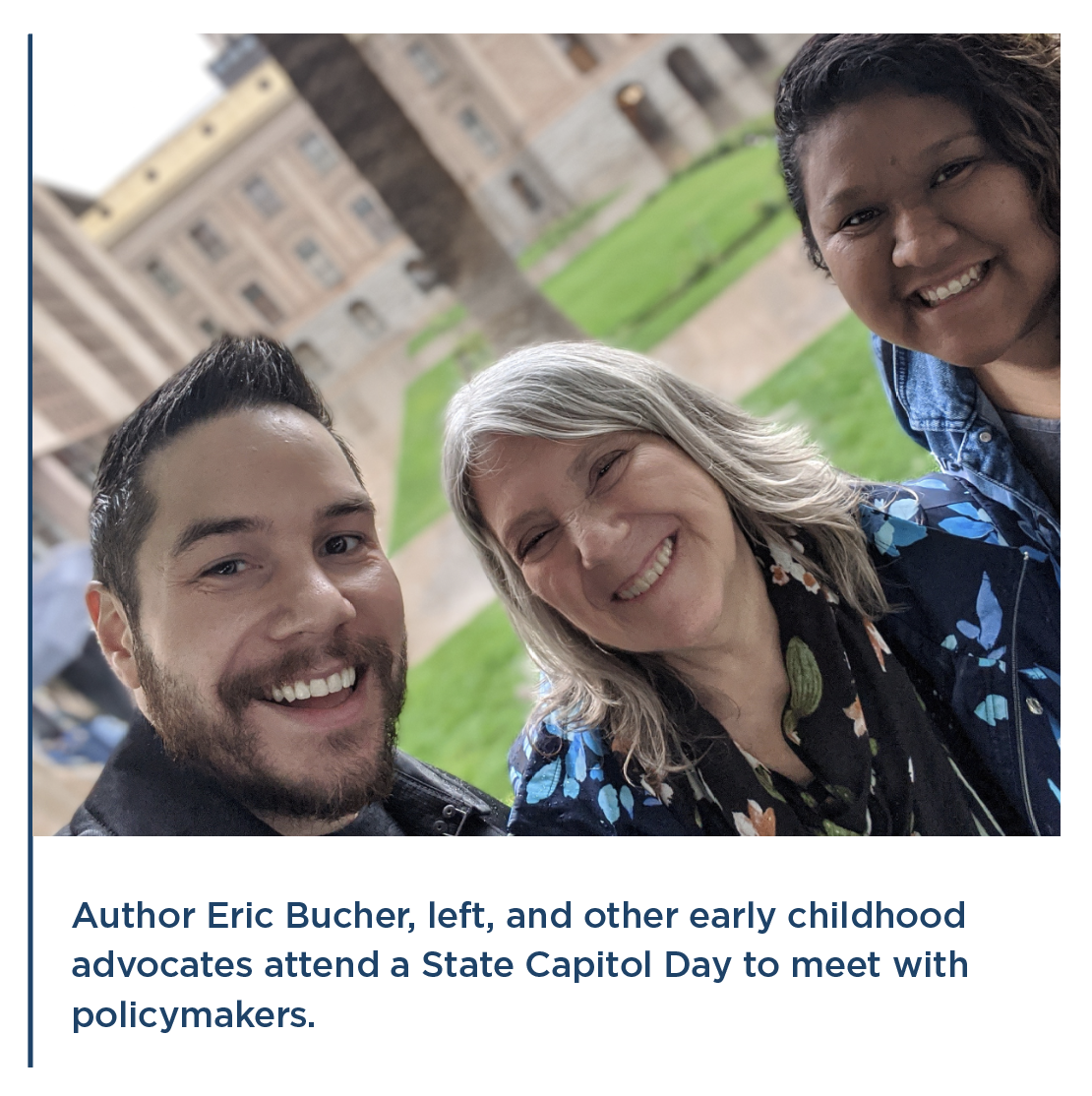 Advocacy is integral to the work of the early childhood profession. NAEYC’s “Professional Standards and Competencies for Early Childhood Educators” defines the role as one that involves being “informed advocates for young children, families, and the profession” (2020b, 24). As an early childhood education professional, you hold an ethical obligation to advocate on behalf of the children in your programs and in your larger communities and to serve as a voice for young children everywhere by leveraging your expertise (NAEYC 2011). Therefore, it is important to stay informed about current issues related to early care and education and to advocate for equitable policies and investments that ensure all children can thrive (Stegenga et al. 2020).
Advocacy is integral to the work of the early childhood profession. NAEYC’s “Professional Standards and Competencies for Early Childhood Educators” defines the role as one that involves being “informed advocates for young children, families, and the profession” (2020b, 24). As an early childhood education professional, you hold an ethical obligation to advocate on behalf of the children in your programs and in your larger communities and to serve as a voice for young children everywhere by leveraging your expertise (NAEYC 2011). Therefore, it is important to stay informed about current issues related to early care and education and to advocate for equitable policies and investments that ensure all children can thrive (Stegenga et al. 2020).
This work also calls on you to connect with others and work together to impact policy and practice to support the rights of families, children, and the profession. Breaking down systemic injustices is vital and begins with those who provide services directly to children and families (NAEYC 2021). Thus, it is essential to
- understand both the strengths and needs of your community in order to secure support and resources centered around equity
- commit to studying and practicing anti-racist, anti-bias education so that your advocacy efforts pursue racial and social justice
- be present, attentive, and reflective
Early childhood advocacy is embedded in everyday interactions, which can include making children’s learning visible in the community, connecting with local officials to increase public funding, and working toward justice and liberation for Black, Indigenous, and people of color (BIPOC) communities and for those who continue to be marginalized by oppressive systems. By engaging with those outside of the field—through legislative meetings, during town hall sessions, and even speaking with people about your work in line at the grocery store or when you are out in your community—you “acknowledge a collective obligation to advocate for the best interests of children” (NAEYC 2011, 6).
What Are We Advocating for?
When we take care of our families and children, we are building humans who then go into communities and build our society. We must put our money, our time, and our energy into rethinking what that looks like and into supporting that process.
–Penni Case, early childhood special education teacher who advocates for quality inclusive settings for children with disabilities
The Unifying Framework for the Early Childhood Education Profession offers a blueprint for key policy and advocacy issues. Educators can use the framework to guide their efforts as they seek specific, systemwide changes in areas such as professional compensation, affordable and accessible child care, and equity and justice for young children and their families (American Federation of State, County and Municipal Employees et al. 2020, 5–9).
Early childhood educators are the workforce that supports the American workforce (USCCF 2021). As Head Start program director María Martínez emphasizes, “The early childhood workforce contributes to the very foundation of the overall economy in our country by making it possible for parents with young children to work in every industry within our workforce.” One necessary systemwide change is a focus on equity, especially on representation and compensation—including pay, benefits, and working conditions—that can advance parity in early childhood education. For example, research shows gaps in access and opportunity for children of color and children with disabilities and wage disparities between Black and White early childhood educators, which affect their health, well-being, and overall life outcomes (Meek et al. 2021).
As an early childhood educator, you can bring your perspectives and knowledge to influence the greater good of the profession.
Early childhood programs are unable to pay staff higher wages without public investment, and we cannot rely solely on families to absorb the cost of quality care. Data show that although many American families experience financial hardships, they pay nearly as much in child care as they might for college tuition (CAP 2021; DOL 2023). Therefore, we should seek competitive pay for comparable qualifications, experience, and responsibilities for educators in a variety of early learning contexts, including community-based centers, school districts, and home-based family child care (American Federation of State, County, and Municipal Employees et al. 2020).
Five Approaches to Becoming an Early Childhood Advocate
To prepare for a conversation with an elected official as an early childhood advocate, you will need to develop targeted, specific legislative “asks.” These are detailed requests pushing for the implementation of early childhood public policies and increased funding that will address the needs of your local community.
For example, you might
- call on legislators to invest state dollars in a grant program to improve access to quality early care and education
- request that lawmakers support diverse early learning options for families, including home-based child care, Head Start and Early Head Start, and other contexts
- work to get funding distributed to state agencies and partners to support the financial, mental, and emotional needs of early educators through wage parity, continuing education, access to college degrees and certification, and training and technical assistance
The following five approaches show you how to craft your message and how to engage with legislators and decision makers.
Tell Your Story
Be yourself. Tell your story, your real story. If there is something that changed your life or something that really touched your heart about the children and families you work with, say it. Elected officials and our communities need to hear from you. They need to know why it is important to support early care and education.
—Edit Hernández, Head Start parent whose family has benefited from having access to quality early learning
As an early educator, your story can be a powerful tool. Preparing an authentic and relatable testimony requires practice, courage, and vulnerability. Bold, brief, personal narratives connected to specific solution-based recommendations work best.
Give yourself the space to reflect deeply and connect with your values. These questions can serve as a starting point:
- What is a special memory about your own childhood experience or your family?
- What do you value about children, families, educators, and your community?
- Why is early care and education important to you as an early childhood professional?
- What successes have you recently experienced in your work and your community?
- What challenges have you recently faced in your work and your community?
- What can your elected official do to help you address the challenges and build on successes?
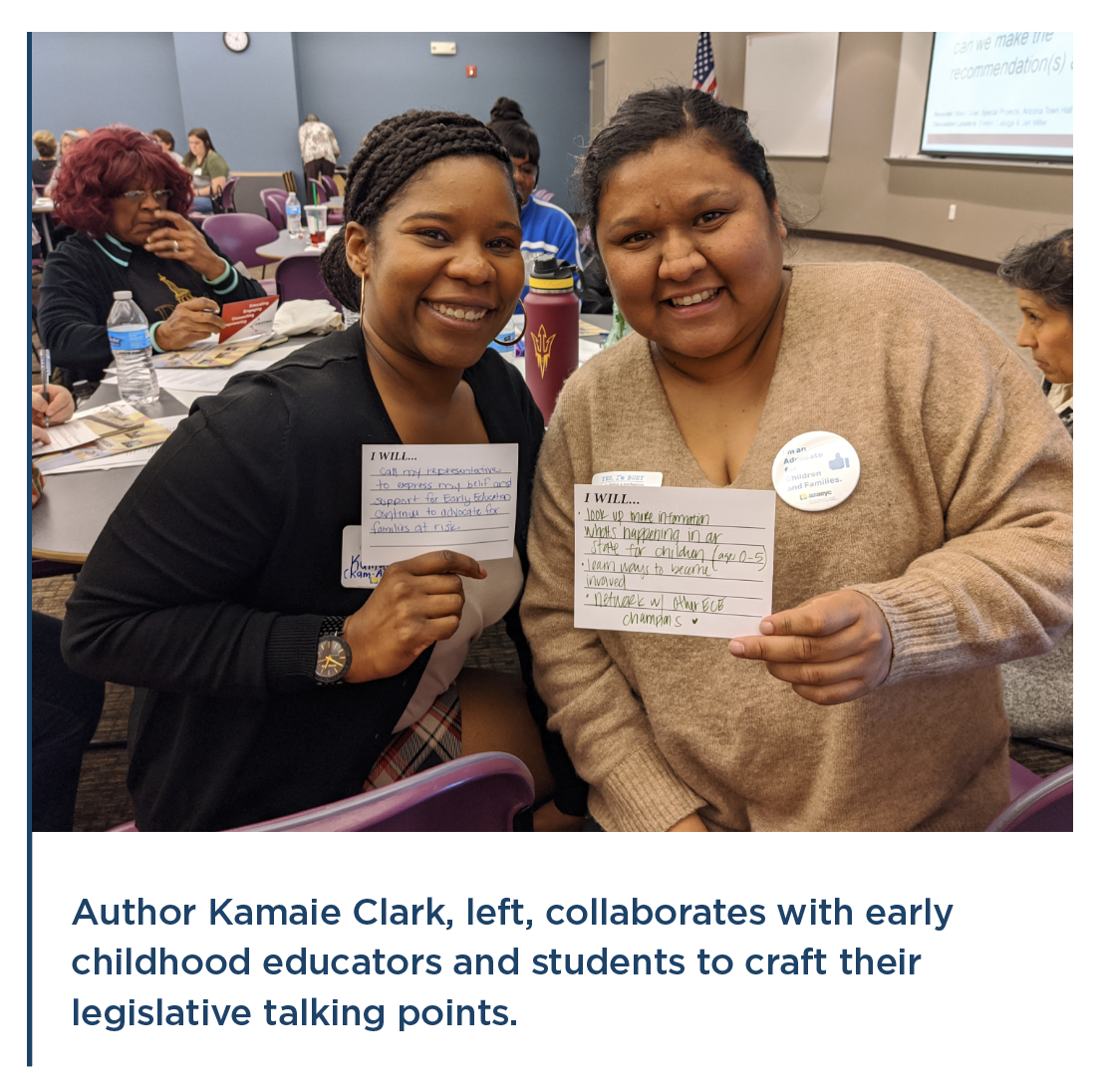 Once you have generated some thoughts, jot down phrases, sentences, or bullet points that stand out to you; then, organize those into cohesive statements. These will become your talking points. Next, consider what could ignite action and compassion when crafting your story. Finally, practice telling your story to family, friends, and colleagues, so when the opportunity arises, you are ready to share with others outside of your friend and family groups.
Once you have generated some thoughts, jot down phrases, sentences, or bullet points that stand out to you; then, organize those into cohesive statements. These will become your talking points. Next, consider what could ignite action and compassion when crafting your story. Finally, practice telling your story to family, friends, and colleagues, so when the opportunity arises, you are ready to share with others outside of your friend and family groups.
To create meaningful, ongoing opportunities for multiple voices with diverse perspectives to engage in leadership and decision-making (NAEYC 2021), consider how you might elevate everyone’s stories and generate practical ideas together to strengthen the early education system. In addition to encouraging colleagues and other teachers to share their stories, you can interview local educators and share the interviews as video clips or written anecdotes online or through social media.
Build Relationships with Elected Officials (and Their Staff)
When you contact an elected official, share your story as a person, as a voter, as a professional. Talk about the children and families that you care for and the impact that you make. Be transparent and open. Have an honest conversation about how you are changing the world by being there for children and supporting their education and supporting families as they go to work or school and need to be away from their children.
—Mona Qafisheh, early childhood professional whose advocacy work focuses on well-compensated, well-supported early childhood educators
Relationships are at the heart of early childhood education. Just as you engage in reciprocal relationships with children and families, you can also build connections with elected officials. When you contact your representatives’ offices, you likely will communicate with staff on their team. Build relationships with legislative staff too, as they contribute policy expertise and can share information and ideas on your behalf when a policymaker is unavailable for meetings or phone calls. Focus time and effort on strengthening your relationships with policymakers—those who design and pass laws. Remember that their job is representing constituents’ needs, like yours, in their legislative districts. (See “Policy and Decision Makers: Whom to Contact" below.) While you may be nervous at first, keep in mind that elected officials are people who live and often work in the local community.
Be sure to educate yourself about regulations that apply to your professional setting. Educators working in some organizations, especially government agencies and nonprofits, have to be mindful of policies and procedures around lobbying. Nevertheless, as a voting citizen, you have every right to advocate and share your story when you are not working.
Policy and Decision Makers: Whom to Contact
There are various levels of elected officials who make decisions about public policy. The local level includes school district members, mayors, city council members, and other municipal leaders. Individuals living in tribal communities have elected council and tribal government representatives. State elected officials include state senators and representatives, governors, and other state government leaders. At the federal level, each citizen is represented by one US representative (the total number per state is based on the state’s population), two US senators, and the US president and vice president. Other elected officials uphold policies and can impact the just (or unjust) implementation of laws. These include judges, justices of the peace, state attorneys general, election clerks, and state education commissioners.
Where can you find the names of and contact information for elected officials? This information is available on secretary of state, state government, and federal congressional websites. For example, you can visit house.gov/representatives and senate.gov to find the contact information for your congressional and senate representatives, respectively. Note who your elected officials are, as they are your points of contact for sharing your story and advocating for local, state, and federal investments in early care and education.
You can connect with elected officials and their staff during both legislative sessions and recesses, when many lawmakers are back home. “With technology and social media, it is now possible to connect with lawmakers, share updated information, and increase awareness online. Using email, virtual meetings, and social media posts demonstrates a professional effectiveness to build and support relationships around our work with young children” (NAEYC 2020). However, even with multiple digital avenues, nothing quite replaces person-to-person phone calls and emails. One of the most impactful statements you can say when connecting with an elected official is “I am a voting constituent.” (See "Contact Your Representative: An Email Template” below.)
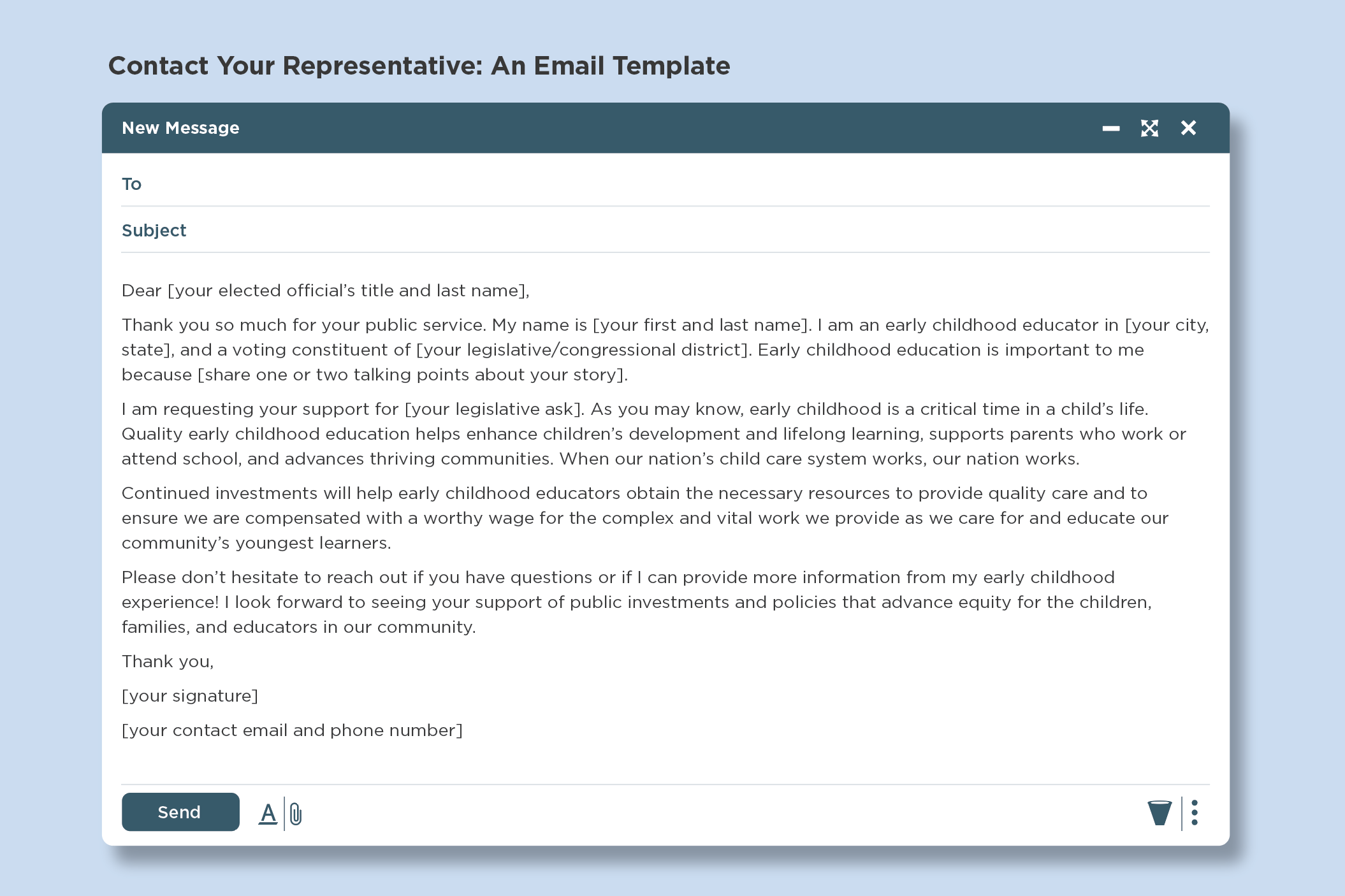
Once you have contacted an elected official, consider requesting a virtual or in-person meeting to elevate stories from the field and to share how the elected official can support children, families, and educators in the local community. When preparing for a meeting, research the issues this official champions by reviewing their websites, social media accounts, previous interviews, and other public resources, and consider connections between your talking points and issues that are important to the official. Many issues that policymakers focus on can be tied to early childhood education. For example:
- When speaking with someone interested in economic development, point out that accessible, affordable child care helps families get to work and school and contributes to a strong economy.
- When speaking with an official interested in racial justice, discuss how investments in early childhood education can help advance quality programs centered around culturally responsive and contextually relevant practices that create caring, equitable communities of learners (NAEYC 2021).
To keep building relationships with legislators and their staff, stay connected, and follow up. Sustaining relationships with these decision makers will help them understand your hopes and dreams for the early childhood profession, and you can serve as someone they can contact for early childhood expertise.
You can learn how early childhood educators like you have successfully developed their advocacy skills to prepare to meet with legislators in “Arizona Early Childhood Public Policy Forums: Approaches in Action” at the end of this article.
Host a Site Visit
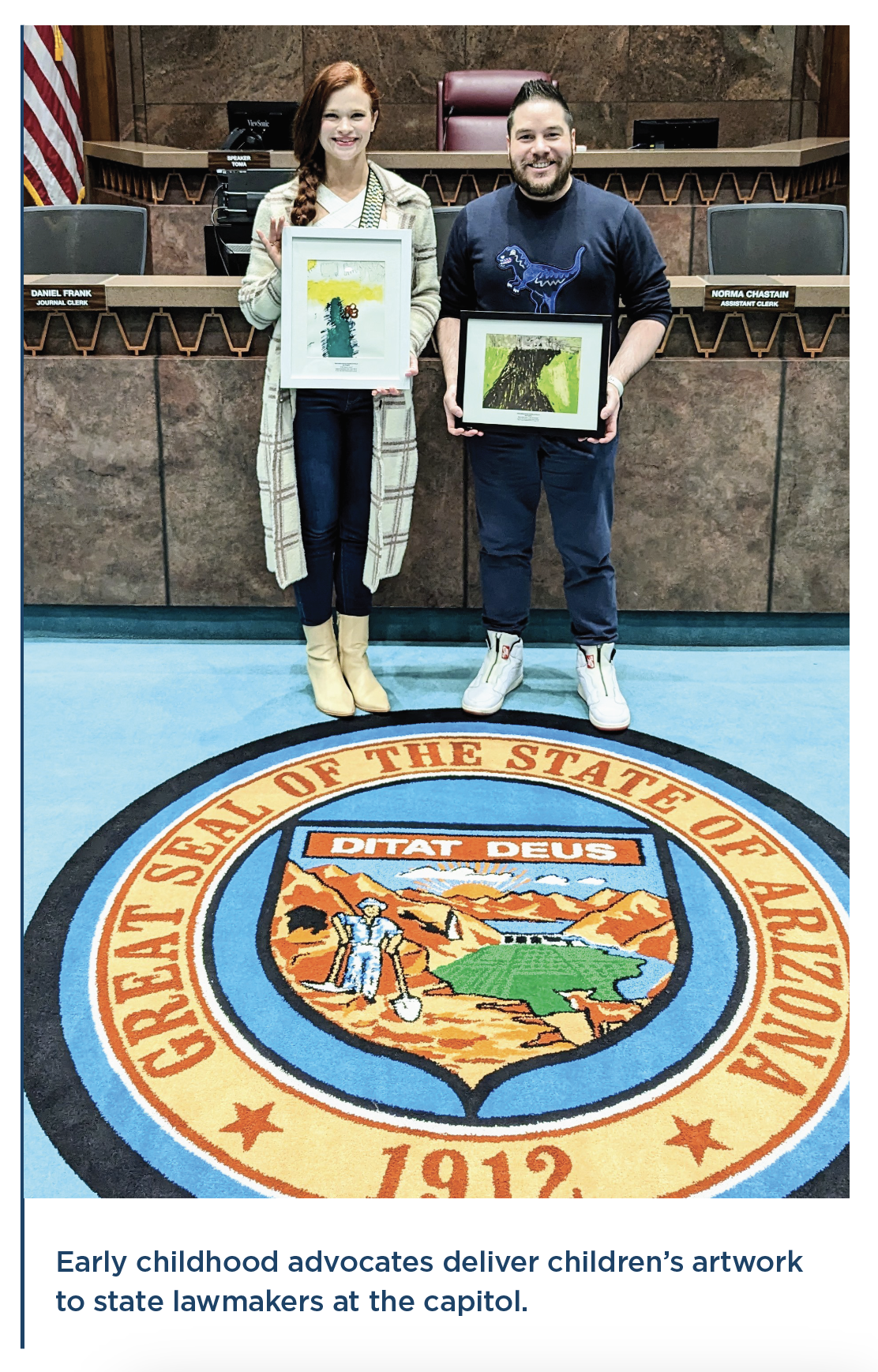 Inviting elected officials and policymakers into early learning contexts will give them the opportunity to see the importance of early childhood education firsthand. You can contact the office of your elected official and ask to set up a site visit. For state and federal lawmakers, it may be easiest to coordinate a visit during legislative recesses when they are out of session.
Inviting elected officials and policymakers into early learning contexts will give them the opportunity to see the importance of early childhood education firsthand. You can contact the office of your elected official and ask to set up a site visit. For state and federal lawmakers, it may be easiest to coordinate a visit during legislative recesses when they are out of session.
Before the visit, inform children, families, and colleagues about what will occur. Because this is an opportune time to highlight your program’s context, confirm any photo or recording permissions with families and the legislative office. When elected officials visit your setting, you can encourage them to participate by reading a children’s book with young learners or speaking with families in an informal listening session.
As you provide the tour of your site, you can point out ways your program supports developmentally appropriate practice. You can do this by sharing photos, videos, and other documentation that exhibit children learning through their relationships with each other, their educators, materials, and the early learning environment. Isauro Escamilla’s “Learning Stories: Observation, Reflection, and Narrative in Early Childhood Education” (2021) and Hilary Seitz’s “Authentic Assessment: A Strengths-Based Approach to Making Thinking, Learning, and Development Visible” (2023) are two recent Young Children articles that offer additional guidance on making learning visible, centering equity through observations and assessments, and telling the stories of families in your early learning program.
At the end of the visit, consider providing children’s artwork with the name of the program and the date of the visit as a visual reminder about early childhood education. Afterward, continue to stay connected with the officials to sustain the relationship and keep early childhood issues at top of mind.
Collaborate with Your Community
Collaborating is especially important. When you are working with other individuals, you brainstorm, and you can come up with better ideas.
—Miranda Brown, toddler teacher in an inclusive toddler classroom who advocates for resources for young children with disabilities
Amy O’Leary, a former NAEYC Governing Board president, invites us to collaborate with families and other educators as “allies in advocacy—fighting for investments in early education and in educators” (2019). Because families can serve as effective advocates for their children and the larger community, encourage them to share their views with decision makers and elevate their stories along with lifting the stories of your colleagues in the early childhood profession. Here are some ways to engage families in the advocacy process:
- Consider hosting a family event and inviting legislative representatives.
- Facilitate an activity for families to write letters to their congressional leaders.
- Invite families to an early childhood day at a state capitol event (Koralek, Nemeth, & Ramsey 2019).
(Read "Encourage Families to be Advocates" below for more information about how to engage families in advocacy work.)
In addition to collaborating with families, join forces with community partners, such as
- Head Start and Early Head Start programs
- institutions of higher education
- child care resource and referral networks
- municipal and state government agencies
- early childhood nonprofits
- local businesses, chambers of commerce, and philanthropic organizations
Organizations like these can help you broaden your community network and tell our story as a collective movement. They can also coordinate and participate in meetings with state and federal legislators and craft unified messaging around shared legislative asks.
Involvement with well-positioned early childhood organizations, such as a state NAEYC affiliate or local chapter, can help you engage in grassroots advocacy and contribute to advancing the profession. There are more than 50 affiliates worldwide plus networks of NAEYC-accredited degree programs and early learning providers in many communities. They may offer opportunities to connect with other early childhood advocates at conferences, board meetings, and networking events. The coordinated efforts of educators to establish and foster relationships with their peers and funders can have a life-changing impact on programs, families, and communities.
Encourage Families to Be Advocates
Some family members enjoy and do well in sharing their views with decision makers. With encouragement and a little direction, they are eager to step up and voice their views on behalf of children beyond your early childhood setting. Engaging families in advocacy work as their children grow and continue in school ensures the family will thrive as lifelong learners. Advocacy can take place on various levels such as local, state, and national advocacy on behalf of children and families. The advocacy efforts can engage both adults and children in the process. For instance, a program might plan and host family events to advocate for funding for early childhood programs in rural areas. Simple letter-writing campaigns to legislators are great ways to involve families in advocating for funding for the community’s child care and early education systems. What does your program do to engage families as advocates for young children and families?
Excerpted from Families & Educators Together: Building Great Relationships that Support Young Children (2019), by Derry Koralek, Karen Nemeth, and Kelly Ramsey
Register to Vote (and Then Vote)
Anyone who is willing to be a part of the solution, step up! Find courage. Find the people who will help you gain the courage to become part of the solution that you want to see in the community you live in.
—Shawn Pearson, early childhood leader who builds collaborative partnerships to provide quality, comprehensive early learning services for children and families
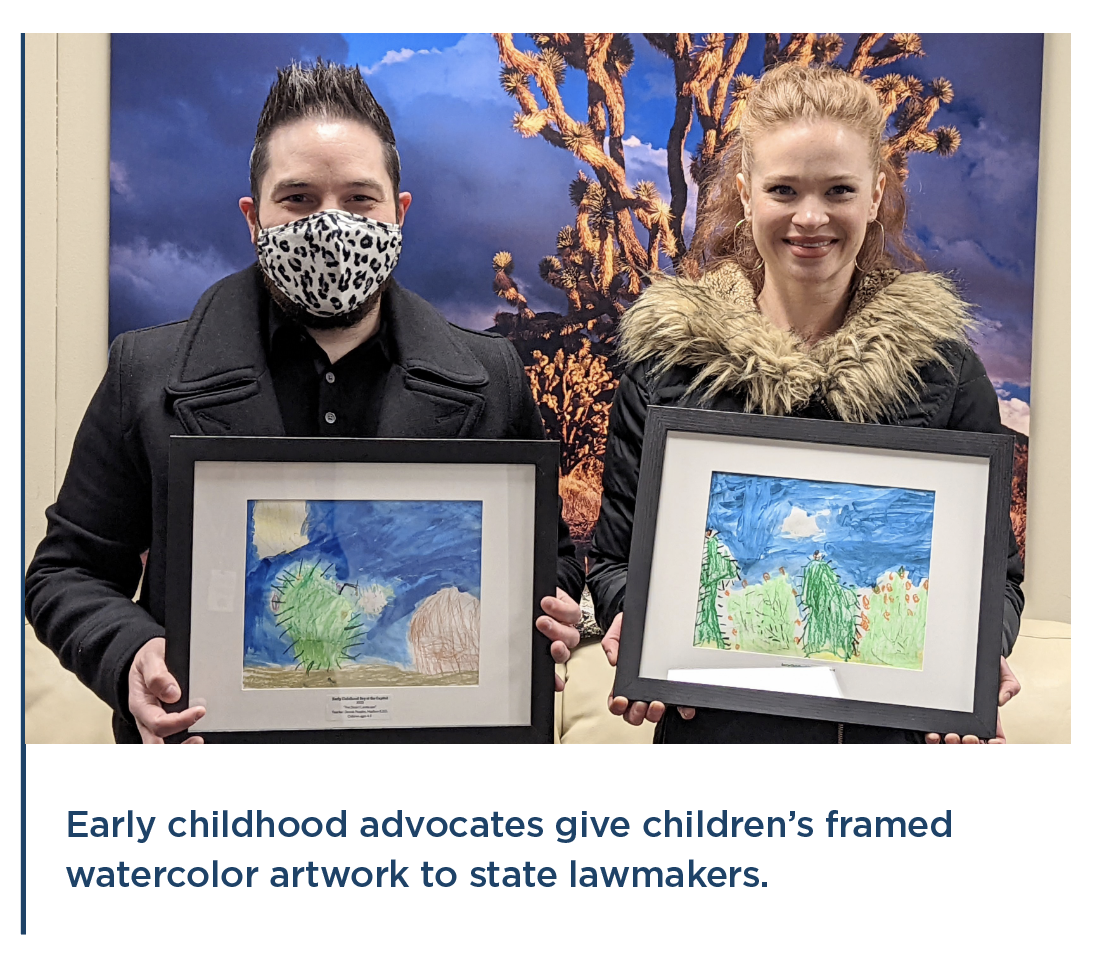 As part of living in a democracy, voting is an important civic duty. As an extension of your voice, your vote helps to elect people who make decisions about funding and public policies. This, in turn, impacts equity, access, and community well-being. The first step is to register to vote. Voting at the local level is just as important as voting for president. Therefore, stay informed about the primary, general, and special election dates. Encourage colleagues and friends to register to vote and inform them about important deadlines.
As part of living in a democracy, voting is an important civic duty. As an extension of your voice, your vote helps to elect people who make decisions about funding and public policies. This, in turn, impacts equity, access, and community well-being. The first step is to register to vote. Voting at the local level is just as important as voting for president. Therefore, stay informed about the primary, general, and special election dates. Encourage colleagues and friends to register to vote and inform them about important deadlines.
Before voting, research candidates running for office to learn more about their support for early childhood education and care. The following questions can help guide your research, whether you are seeking information online or posing questions directly to a candidate at a gathering, like a town hall meeting or candidate debate:
- How does this candidate support children and families in our community?
- How will they support early childhood professionals in our community?
- How will they work to advance equity and racial and social justice for young children, families, and educators?
- Why is early learning important to this candidate? How will they ensure investments in early learning?
Finally, many educators and families face inequitable access to voting. Support their right to vote. Stand up and speak out against systemic voting oppression. You can take action by coordinating efforts to bring people to the polls. You can also give testimony on bills that are harmful to marginalized populations, including members of BIPOC communities whose voices have historically been—and continue to be—silenced.
Involvement with well-positioned early childhood organizations can help you engage in grassroots advocacy and contribute to advancing the profession.
In Conclusion: Join In
To advance a vibrant and just early childhood profession, become an early childhood advocate and help raise up your and your communities’ voices. You can make a difference. We are stronger when we come together to ensure that our early childhood profession and the children we serve have what is necessary to survive and thrive. Your voice, combined with the voices of other early childhood educators, is powerful. Collectively, we can make the right to quality care, joy, and equity a reality today and for future generations.
Arizona Early Childhood Public Policy Forums: Approaches in Action
Over the past four years, Arizona’s two NAEYC affiliates, early childhood nonprofits, Arizona’s child care resource and referral agency, and the Arizona Head Start Association have collaborated to offer an annual early childhood public policy forum ahead of the Arizona Early Childhood Day at the State Capitol event.
Through town hall-style professional development sessions, diverse groups of family members, educators, and community champions have come together to discuss how investment in early child care and education advances vibrant, equitable, thriving communities. Between 2019 and 2023, more than 360 attendees joined these annual public policy forum events. Participants learned about state and federal updates, crafted their talking points, and practiced telling their stories in preparation for meeting with policymakers. They organized as part of a collective and activated network of early childhood advocates and developed a unified voice to ask legislators for support.
After the public policy forum, with facilitated support, the participants met with elected officials to share their stories and discuss the importance of public investments in child care. Hundreds of family members, educators, and community members participated in approximately 75 meetings with state representatives and 15 meetings with their federal congressional delegation.
Public policy forums can serve as a helpful on-ramp to beginning your work as an advocate. In addition, various early childhood education professional organizations facilitate advocacy skills-building and networking opportunities. To learn more about how you can get involved, visit NAEYC.org/get-involved and connect with your state’s NAEYC affiliate.
Authors’ note: The authors thank the many early childhood educators, state partners, and community collaborators whose perspectives and wealth of knowledge have contributed to our collective advocacy work over the past several years. We are grateful for their wisdom and commitment to the challenging but important work of advancing equity in early childhood.
Photographs: courtesy of the authors
Copyright © 2023 by the National Association for the Education of Young Children. See Permissions and Reprints online at NAEYC.org/resources/permissions.
References
American Federation of State, County and Municipal Employees, et al. 2020. Unifying Framework for the Early Childhood Education Profession. Washington, DC: NAEYC. powertotheprofession.org/wp-content/uploads/2020/03/Power-to-Profession-Framework-03312020-web.pdf.
CAP (Center for American Progress). 2021. “The True Cost of High-Quality Child Care Across the United States.” Washington, DC: Center for American Progress. americanprogress.org/article/true-cost-high-quality-child-care-across-united-states.
Edwards, C.P., & L. Gandini. 2015. “Teacher Research in Reggio Emilia, Italy: Essence of a Dynamic, Evolving Role.” Voices of Practitioners 10 (1): 89–103.
Edwards, C., L. Gandini, & G. Forman, eds. 2012. The Hundred Languages of Children: The Reggio Emilia Experience in Transformation, 3rd edition. Santa Barbara, CA: Praeger.
Escamilla, I.M. 2021. “Learning Stories: Observation, Reflection, and Narrative in Early Childhood Education.” Young Children 76 (2): 33-39.
IOM (Institute of Medicine) & NRC (National Research Council). 2015. Transforming the Workforce for Children Birth Through Age 8: A Unifying Foundation. Washington, DC: The National Academies Press. https://doi.org/10.17226/19401.
Koralek, D., K. Nemeth, & K. Ramsey. 2019. Families & Educators Together: Building Great Relationships that Support Young Children. Washington, DC: NAEYC.
Meek, S., I.U. Iruka, R. Allen, D.A. Yazzie, V. Fernandez, E. Catherine, K, McIntosh, L. Gordon, W. Gilliam, M. L. Hemmeter, D. Blevins, & T. Powell. Start with Equity: 14 Priorities to Dismantle Systemic Racism in Early Care and Education. (Tempe, AZ: The Children’s Equity Project, 2021), childandfamilysuccess.asu.edu/cep/initiatives/start-with-equity-14-priorities-dismantle-systemic-racism-early-care-education.
NAEYC. 2011. “Code of Ethical Conduct and Statement of Commitment.” Position statement. Washington, DC: NAEYC. naeyc.org/resources/position-statements/ethical-conduct.
NAEYC. 2020a. “Developmentally Appropriate Practice.” Position statement. Washington, DC: NAEYC. naeyc.org/resources/position-statements/dap/contents.
NAEYC. 2020b. “Professional Standards and Competencies for Early Childhood Educators.” Position statement. Washington, DC: NAEYC. naeyc.org/resources/position-statements/professional-standards-competencies.
O’Leary, A. 2019. “From Our President. Becoming Our Own Best Advocates.” Young Children 74 (5): 55–59.
Seitz, H. 2023. “Authentic Assessment: A Strengths-Based Approach to Making Thinking, Learning, and Development Visible.” Young Children 78 (1): 6–13.
Stegenga, S.M., A. Skubel, C. Corr, & S. Nagro. 2020. “Your Voice Matters: A Practitioner’s Guide for Engaging in Policy Through Advocacy.” Young Exceptional Children 25 (1): 42–43.
USCCF (United States Chamber of Commerce Foundation). 2021. “Untapped Potential: Economic Impact of Childcare Breakdowns on U.S. States.” Washington, DC: U.S. Chamber of Commerce. www.uschamberfoundation.org/reports/untapped-potential-economic-impact-childcare-breakdowns-us-states.
DOL (United States Department of Labor). 2023. “Child Care Prices in Local Areas: Initial Findings from the National Database of Childcare Prices.” www.dol.gov/sites/dolgov/files/WB/NDCP/508_WB_IssueBrief-NDCP-20230213.pdf.
Eric Bucher, EdD, works to advance equity and advocate for a well-supported, well-compensated early childhood profession as the executive officer of the Arizona Association for the Education of Young Children. [email protected]
Kamaie Clark, MEd, is the president of Arizona Association for the Education of Young Children. Kamaie supports local and national teams of professional development coaches with Southwest Human Development, Arizona’s largest nonprofit organization, dedicated to serving families and children. [email protected]
Kelly Ann Larkin, MA in TTE/ECE, is the executive director of Southern Arizona Association for the Education of Young Children and fulltime faculty at Central Arizona College. Kelly has worked as an early childhood educator for over 36 years in Maine, Vermont, Massachusetts, and Arizona. [email protected]